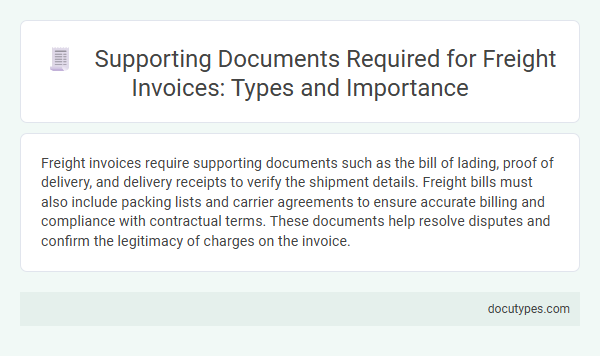Freight invoices require supporting documents such as the bill of lading, proof of delivery, and delivery receipts to verify the shipment details. Freight bills must also include packing lists and carrier agreements to ensure accurate billing and compliance with contractual terms. These documents help resolve disputes and confirm the legitimacy of charges on the invoice.
Introduction to Freight Invoices and Supporting Documents
Freight invoices are essential documents that detail the charges associated with transporting goods from one location to another. These invoices must be accurate and supported by relevant documentation to ensure proper verification and payment processing.
Supporting documents for freight invoices typically include bills of lading, delivery receipts, and freight manifests. These documents provide proof of shipment, delivery confirmation, and details about the cargo, which help validate the charges listed on the invoice.
Why Supporting Documents Matter in Freight Billing
Supporting documents are essential for verifying the accuracy and legitimacy of freight invoices. They help resolve disputes and ensure timely payment in freight billing processes.
- Proof of Delivery (POD) - Confirms that the shipment reached its destination and supports the billed charges.
- Bill of Lading (BOL) - Acts as a receipt and contract, detailing shipment contents and terms between shipper and carrier.
- Freight Weight Tickets - Provides evidence of shipment weight, which directly affects freight costs and billing accuracy.
Common Types of Supporting Documents for Freight Invoices
Freight invoices require specific supporting documents to ensure accurate verification and payment processing. These documents provide detailed information about the shipment, costs, and delivery.
Common types of supporting documents for freight invoices include Bills of Lading, which serve as proof of shipment and receipt of goods. Delivery Receipts verify that the cargo was delivered as agreed. Packing Lists detail the contents of the shipment, ensuring all items are accounted for during transit and delivery.
Bill of Lading: Definition and Role
The Bill of Lading (BOL) is a critical supporting document for freight invoices, serving as a legal receipt and contract between the shipper and carrier. It outlines the type, quantity, and destination of the goods being transported, ensuring accurate billing and delivery verification. Freight invoices reference the BOL to validate shipment details and confirm the terms agreed upon during transportation.
Proof of Delivery (POD): Significance and Usage
| Supporting Document | Significance | Usage in Freight Invoices |
|---|---|---|
| Proof of Delivery (POD) | Serves as official confirmation that goods have been received by the consignee or authorized representative. Contains essential details such as delivery date, time, recipient's signature, and condition of goods upon arrival. | Used to validate the completion of the delivery process for freight invoices. Acts as a critical verification document to prevent disputes over shipment receipt and to support payment authorization. Facilitates accurate billing by confirming exact delivery details tied to the invoice. |
Commercial Invoice: Key Elements for Freight Claims
Commercial invoices are essential supporting documents for freight invoices, providing detailed information critical for freight claims. They verify the transaction details and facilitate the resolution of disputes in shipping processes.
- Accurate Description of Goods - The invoice must clearly state the nature and quantity of shipped items to validate the freight claim.
- Declared Value - Specifies the monetary value of goods, which is crucial for liability and insurance coverage during transit.
- Consignor and Consignee Information - Identifies the parties involved in the shipment, ensuring traceability and accountability for the freight services.
Packing List: Supporting Freight Accuracy
The packing list is a crucial supporting document for freight invoices. It ensures the accuracy of the shipment details reflected in your billing.
- Shipment Verification - The packing list provides detailed information about the contents and quantities of the shipment, verifying what was actually transported.
- Discrepancy Resolution - It helps identify any mismatches between shipped goods and invoiced items, preventing errors in freight charges.
- Customs Compliance - The packing list supports compliance with customs regulations by documenting the shipment's contents clearly and precisely.
Including an accurate packing list with your freight invoice streamlines payment processes and helps avoid disputes.
Customs Documents for International Shipments
Customs documents are essential for processing freight invoices related to international shipments. These documents verify the contents, value, and origin of the goods transported across borders.
Key customs documents include the commercial invoice, bill of lading, and export/import declarations. Ensuring your freight invoice includes these supporting documents helps prevent delays and facilitates compliance with customs regulations.
Importance of Supporting Documents in Dispute Resolution
Which supporting documents are required for accurate freight invoice processing? Proper documentation ensures clarity in billing details and aids in verifying shipment specifics. These documents help prevent errors that might lead to disputes during invoice reconciliation.
Why is the importance of supporting documents critical in dispute resolution for freight invoices? Supporting documents provide concrete evidence that can validate charges and shipment claims, expediting conflict resolution. Your ability to present detailed records strengthens your position in resolving discrepancies efficiently.
Which Supporting Documents Are Needed for Freight Invoices? Infographic

